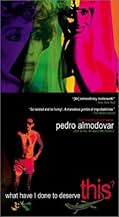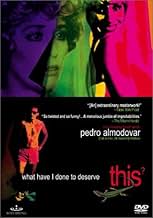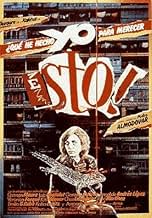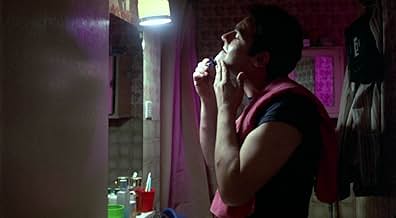O que Eu Fiz para Merecer Isto?
Título original: ¿Qué he hecho YO para merecer esto!!
AVALIAÇÃO DA IMDb
7,1/10
12 mil
SUA AVALIAÇÃO
As vicissitudes de Gloria, uma dona de casa neurótica, e os caracteres peculiares de sua família.As vicissitudes de Gloria, uma dona de casa neurótica, e os caracteres peculiares de sua família.As vicissitudes de Gloria, uma dona de casa neurótica, e os caracteres peculiares de sua família.
- Prêmios
- 5 vitórias e 1 indicação no total
Gonzalo Suárez
- Lucas Villalba
- (as Gonzalo Suarez)
Ángel de Andrés López
- Antonio
- (as Angel de Andres-Lopez)
Kiti Mánver
- Juani
- (as Kiti Manver)
Sonia Hohmann
- Vanessa
- (as Sonia Anabela Holimann)
Pedro Almodóvar
- Play-Back 'La bien pagá'
- (as Almodovar-McNamara)
Fabio McNamara
- Play-Back 'La bien pagá'
- (as Fany Mc Namara, Almodovar-McNamara)
Miguel Ángel Herranz
- Miguel
- (as Miguel Angel Herranz)
Avaliações em destaque
By far not my best Almodovar film, but it is a winner as is! The more films I get to see from this one-of-a-kind (as all pioneers!) director, the more I love his work.
In this 4th film of his, he starts out with his usual absurd, peculiar humour and his trademark hilarious characters. If you have seen any of these other films of his: 'Pepi, Luci, Bom and Other Girls on the Heap', 'Labyrinth of passion', 'Kika', 'Matador', 'Women on the Verge of a Nervous Breakdown' plus more, you know what to expect. Almodovar humour is unique and it's here. The big difference in this one is that from a point and on, Almodovar fits in a sad tone, slowing the pace down and converting the film to a drama half-way - despite the fact he does not leave out some humour element - in this very special Almodovar way.
I suppose this should do also for people who didn't like half of Almodovar films (the more offensive ones), maybe because things are more serious in this or maybe because one can distinguish the director's point more easily than in other, more hillariously absurd, almost surreal ones.
In this 4th film of his, he starts out with his usual absurd, peculiar humour and his trademark hilarious characters. If you have seen any of these other films of his: 'Pepi, Luci, Bom and Other Girls on the Heap', 'Labyrinth of passion', 'Kika', 'Matador', 'Women on the Verge of a Nervous Breakdown' plus more, you know what to expect. Almodovar humour is unique and it's here. The big difference in this one is that from a point and on, Almodovar fits in a sad tone, slowing the pace down and converting the film to a drama half-way - despite the fact he does not leave out some humour element - in this very special Almodovar way.
I suppose this should do also for people who didn't like half of Almodovar films (the more offensive ones), maybe because things are more serious in this or maybe because one can distinguish the director's point more easily than in other, more hillariously absurd, almost surreal ones.
Pedro Almodóvar's 1984 film What Have I Done to Deserve This!? is as much as a mouthful as it is to say as it might be to entirely summarise. The sheer extravagancy of the title, which is '¿Qué he hecho yo para merecer esto!!' in Spanish, echoes the broad and rather open canvas on which the breakthrough Spanish director paints his portraits and the fates of an equally rather disparate group of Spaniards tumbling out of Franco's Spain. The setting is 1980s Madrid, the capital of a nation that has since come out of a political reign of a definitive sort and is now on the brink of ending three quarters of a decade under a fresher, freer political situation. This as the film covers two groups, indeed families or classes, whom have progressed out of the old times and into the new ones. As a whole, the film works as a somewhat sly comedy and pays substantial attention to Spain as a nation by way of its capital city and those that inhabit it.
The film opens with a collection of odd, colourful titles which is in direct contrast in terms of basic codes and conventions to the activity going on behind it; that being of a martial art variety in which shouting and the flinging around of wooden poles as a dozen or so people twist and turn in perfect unison is played out. Gloria (Maura), a middle-aged cleaner whom works at the recreation hall in which these people practice, reenacts what she observes in what is a rare moment during which we see her doing something that seems planned, ordained and conclusive. This fleeting moment of control and rhythm we see her engage in is in stark contrast to her chaotic home life, in which she must contend with two teenage sons whom are either homosexual or dealing drugs in their spare time; a brute of a husband, named Antonio (López), who wants to be with another woman but when he is with Gloria, makes love to her despite close family members being in near proximity as well as a mother-in-law named Abuela (Lampreave), who comes with her own quirks.
What Have I Done to Deserve This!? works as a character piece exploring the women in the film such as Gloria, her mother-in-law and neighbour Cristal (Forqué), who's additionally a prostitute. Most of the women in the film are good-natured and tend to lean more towards helping and aiding others as they stick together, their existence playing out amidst men, or indeed male characters, of whom are deeply flawed in their characteristics and attitudes as domestic violence; confusion over sexuality; paedophilia; drug infused lifestyles and infidelity are the majority of characteristics they embody.
Despite the sheer level of characters in the film, Almodóvar does a credible job in balancing the right amount of both introduction and progression required for each person. Antonio, for instance, is established to have known a German woman who was someone that was into Nazi memorabilia, but whom he drove around as a chauffeur many years ago and developed a bond with anyway. This, followed by scene in which he reiterates the importance of one's signature on a level with one's surname to one of his sons; an exchange in which the aim is to evoke a sense of individualism and identity, that you are one amongst the rest and ought to be proud of who you are. The link to the woman affiliated with the aforementioned woman is still fresh and sets up a relatively unnerving sense about Antonio, something that additionally arises later on to do with forgery of a German manuscript.
The characters in What Have I Done to Deserve This? walk rainy, grey and unwelcoming Spanish streets; the film is shot in a manner that acts as an anti-thesis to how tourists view Spain. The majority of the people in the film are poor; indeed Gloria's dysfunctional family we zero in on for the duration of the film turn to counterfeiting and drug dealing to sustain an income. Next door, Cristal entertains a number of male clients; one of which very early on is a supposedly well-off writer whose financial situation doesn't seem as desperate as everyone else's, but this doesn't, in any way at all, elevate him above those of Gloria's family as his infidelity and ideas of a criminal nature play out.
The film, in the nicest possible way, feels like three or four going on at once. There are moments, indeed a number of premises, which you feel would make films all by themselves; situations that Almodóvar could flesh out even more than what he does. This echoes what he does in his 2006 piece entitled Volver, in which three women come about a series of bizarre incidences but just seem to act around them rather than act because of them. Almodóvar does this as a director; keeping everything as low key as possible as content of a pretty disturbing nature such as the murder of one's partner and a drug dealing teenager just seems to 'happen' around this housewife and middle aged woman who lives in a crazy, mixed up world. Almodóvar doesn't exploit these things for sake of cheap laughs, instead opting to point out that these problems contained within Spain's society are still prominent, regardless of what positives one might take out of it being a decade on from Franco's regime. The film operates as a rather black comedy, as a somewhat stripped down drama with its fair share of powerful moments and as an interesting case study between classes and gender.
The film opens with a collection of odd, colourful titles which is in direct contrast in terms of basic codes and conventions to the activity going on behind it; that being of a martial art variety in which shouting and the flinging around of wooden poles as a dozen or so people twist and turn in perfect unison is played out. Gloria (Maura), a middle-aged cleaner whom works at the recreation hall in which these people practice, reenacts what she observes in what is a rare moment during which we see her doing something that seems planned, ordained and conclusive. This fleeting moment of control and rhythm we see her engage in is in stark contrast to her chaotic home life, in which she must contend with two teenage sons whom are either homosexual or dealing drugs in their spare time; a brute of a husband, named Antonio (López), who wants to be with another woman but when he is with Gloria, makes love to her despite close family members being in near proximity as well as a mother-in-law named Abuela (Lampreave), who comes with her own quirks.
What Have I Done to Deserve This!? works as a character piece exploring the women in the film such as Gloria, her mother-in-law and neighbour Cristal (Forqué), who's additionally a prostitute. Most of the women in the film are good-natured and tend to lean more towards helping and aiding others as they stick together, their existence playing out amidst men, or indeed male characters, of whom are deeply flawed in their characteristics and attitudes as domestic violence; confusion over sexuality; paedophilia; drug infused lifestyles and infidelity are the majority of characteristics they embody.
Despite the sheer level of characters in the film, Almodóvar does a credible job in balancing the right amount of both introduction and progression required for each person. Antonio, for instance, is established to have known a German woman who was someone that was into Nazi memorabilia, but whom he drove around as a chauffeur many years ago and developed a bond with anyway. This, followed by scene in which he reiterates the importance of one's signature on a level with one's surname to one of his sons; an exchange in which the aim is to evoke a sense of individualism and identity, that you are one amongst the rest and ought to be proud of who you are. The link to the woman affiliated with the aforementioned woman is still fresh and sets up a relatively unnerving sense about Antonio, something that additionally arises later on to do with forgery of a German manuscript.
The characters in What Have I Done to Deserve This? walk rainy, grey and unwelcoming Spanish streets; the film is shot in a manner that acts as an anti-thesis to how tourists view Spain. The majority of the people in the film are poor; indeed Gloria's dysfunctional family we zero in on for the duration of the film turn to counterfeiting and drug dealing to sustain an income. Next door, Cristal entertains a number of male clients; one of which very early on is a supposedly well-off writer whose financial situation doesn't seem as desperate as everyone else's, but this doesn't, in any way at all, elevate him above those of Gloria's family as his infidelity and ideas of a criminal nature play out.
The film, in the nicest possible way, feels like three or four going on at once. There are moments, indeed a number of premises, which you feel would make films all by themselves; situations that Almodóvar could flesh out even more than what he does. This echoes what he does in his 2006 piece entitled Volver, in which three women come about a series of bizarre incidences but just seem to act around them rather than act because of them. Almodóvar does this as a director; keeping everything as low key as possible as content of a pretty disturbing nature such as the murder of one's partner and a drug dealing teenager just seems to 'happen' around this housewife and middle aged woman who lives in a crazy, mixed up world. Almodóvar doesn't exploit these things for sake of cheap laughs, instead opting to point out that these problems contained within Spain's society are still prominent, regardless of what positives one might take out of it being a decade on from Franco's regime. The film operates as a rather black comedy, as a somewhat stripped down drama with its fair share of powerful moments and as an interesting case study between classes and gender.
One thing about Pedro Almodovar's films is that they are never boring. Another is that women do whatever they need to do to get by. This film is no different and it is almost as if he followed the theme here with Volver. In fact, the star of this film, Carmen Maura, is also in Volver.
Gloria (Carmen Maura) does whatever she needs to do to get by, whether it is popping No-Doze or sniffing glue. She works constantly to provide for her family, as her no-good husband (Ángel de Andrés López) is not pulling his weight.
One son sells dope and the other likes to have sex with his friend's fathers. Grandma (Chus Lampreave) sits around talking about the village.
Her best friend Cristal (Verónica Forqué - Matador) is a prostitute.
Almodovar presents an upside down world where everything is exaggerated. This is a thinking man's movie. You really have to pay attention to get it. That is not to say it is not enjoyable, but you miss a lot by not fully participating.
You notice that Cristal is a lot more mentally healthy that Gloris; that her son is not a victim, but in charge of his sexuality; and there is enough other things going on to really keep you interest.
Almodovar is never boring.
Gloria (Carmen Maura) does whatever she needs to do to get by, whether it is popping No-Doze or sniffing glue. She works constantly to provide for her family, as her no-good husband (Ángel de Andrés López) is not pulling his weight.
One son sells dope and the other likes to have sex with his friend's fathers. Grandma (Chus Lampreave) sits around talking about the village.
Her best friend Cristal (Verónica Forqué - Matador) is a prostitute.
Almodovar presents an upside down world where everything is exaggerated. This is a thinking man's movie. You really have to pay attention to get it. That is not to say it is not enjoyable, but you miss a lot by not fully participating.
You notice that Cristal is a lot more mentally healthy that Gloris; that her son is not a victim, but in charge of his sexuality; and there is enough other things going on to really keep you interest.
Almodovar is never boring.
10dgabunia
Early Almodovar is something that always keeps me fascinated! He's absolutely free of all his refined technical skills (latest films) and a real "hooligan", provoking, and full of brilliant jokes. "What have I done to deserve this?" is one of my top-Almodovar films, due to magnificent acting of Carmen Maura but not only. Almodovar, not yet burdened by the reputation of "maestro" is extremely free in expression, he does everything what is allowed and "not allowed" to do in cinema. Terrific mixture of Italian neo-realism, (remember the last episode, when Carmen sees off her family and returns home..) marvelous sarcasm, parody on intellectual cinema, and a tart-like melodrama with too much sugar. This is called Almodovar, a genius who is not afraid to seem foolish and therefore never seems foolish. A genius of KITSCH!
Haven't seen this film yet? What a lucky one you are! Be prepared for unforgettable impressions. And finally: Highly recommended for those who enjoyed "VOLVER" (these two films have much in common)
Haven't seen this film yet? What a lucky one you are! Be prepared for unforgettable impressions. And finally: Highly recommended for those who enjoyed "VOLVER" (these two films have much in common)
I love Pedro Almodovar. He is a marvelous, fun, uninhibited filmmaker who has made so many great films, including "Woman on the Verge of a Nervous Breakdown," "Volver," "All About My Mother," "Broken Embraces," and others.
This is an offbeat film about dysfunction like you've never seen it. OMG. Carmen Maura plays Gloria, who is addicted to No-Doz and works as a maid in Madrid. She's married to a jerk who drives a taxi and is a forger. He's crazy over a German singer, his former employer.
The couple has two sons. One is a gay hustler, and the other sells drugs.
Her mother-in-law lives with them, a woman who is constantly trying to obtain food as if it's gold and then sells it to the family.
Now they have a good chance at some big money, when Gloria's husband has a chance to forge Hitler's memoirs and have his old employer pretend to be the owner. Gloria also gives her hustler son to her dentist. You read that right.
Gloria's best friend is her neighbor, the hilarious Cristal, a call girl who wants to go to Vegas. Her other neighbor has a young child that she's awful to, at least verbally, but the child has magic powers.
I did say it was off the wall.
In the midst of all this, there is drama and poignancy of a woman doing anything she can to survive in the city during Franco's regime.
Someone said that the way Almodovar sets things up, you don't know whether to laugh or cry. But if you do both, there may just be a solution.
You have to take Almodovar as he is - wild, funny, with a message about humanity there. This film is outrageous. I loved it.
This is an offbeat film about dysfunction like you've never seen it. OMG. Carmen Maura plays Gloria, who is addicted to No-Doz and works as a maid in Madrid. She's married to a jerk who drives a taxi and is a forger. He's crazy over a German singer, his former employer.
The couple has two sons. One is a gay hustler, and the other sells drugs.
Her mother-in-law lives with them, a woman who is constantly trying to obtain food as if it's gold and then sells it to the family.
Now they have a good chance at some big money, when Gloria's husband has a chance to forge Hitler's memoirs and have his old employer pretend to be the owner. Gloria also gives her hustler son to her dentist. You read that right.
Gloria's best friend is her neighbor, the hilarious Cristal, a call girl who wants to go to Vegas. Her other neighbor has a young child that she's awful to, at least verbally, but the child has magic powers.
I did say it was off the wall.
In the midst of all this, there is drama and poignancy of a woman doing anything she can to survive in the city during Franco's regime.
Someone said that the way Almodovar sets things up, you don't know whether to laugh or cry. But if you do both, there may just be a solution.
You have to take Almodovar as he is - wild, funny, with a message about humanity there. This film is outrageous. I loved it.
Você sabia?
- CuriosidadesVictoria Abril turned down the role of Cristal, as she didn't want to play another prostitute, having just played one recently.
- ConexõesFeatured in A História do Cinema: Uma Odisseia: European New Wave (2011)
Principais escolhas
Faça login para avaliar e ver a lista de recomendações personalizadas
- How long is What Have I Done to Deserve This??Fornecido pela Alexa
Detalhes
Bilheteria
- Faturamento bruto mundial
- US$ 690
- Tempo de duração
- 1 h 41 min(101 min)
- Mixagem de som
- Proporção
- 1.85 : 1
Contribua para esta página
Sugerir uma alteração ou adicionar conteúdo ausente

![Assistir a Tráiler [OV]](https://m.media-amazon.com/images/M/MV5BYTM3Y2Q4NTMtZDZmZC00M2E3LWE2ZmQtZWQzM2Q4NjIyNWU1XkEyXkFqcGdeQXRyYW5zY29kZS13b3JrZmxvdw@@._V1_QL75_UX500_CR0)






























